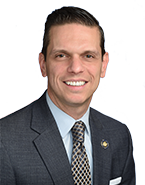Senator Michelle Hinchey and Assemblyman Angelo Santabarbara Unveil Bill to Stabilize Rural Ambulance Services During National EMS Week
Schenectady, NY – Today, Assemblyman Angelo Santabarbara (AD-111) and State Senator Michelle Hinchey (SD-46) joined Rotterdam EMS in Schenectady to announce legislation (S.3503C/A.1561C) to establish the New York State Rural Ambulance Services Task Force to study the challenges facing rural emergency medical service (EMS) providers and identify long-term solutions to keep these services available to rural residents across New York State. Stakeholders of the task force would be charged with assessing and providing recommendations on the business and funding models of rural ambulance corps statewide.
“For far too long, families in rural communities have dealt with unequal access to critical health care – an issue that has only been exacerbated by the COVID-19 pandemic,” said Assemblyman Angelo Santabarbara. “Thousands of rural New Yorkers rely on this critical emergency medical service to provide lifesaving interventions, and yet dozens of our rural ambulance services have been forced to permanently close their doors, while others continue to lose valuable employees. We cannot allow these problems to continue to fall by the wayside, especially at a time when these critical services are more important than ever. I’ll continue fighting to enhance the quality of life for rural New Yorkers as we continue on our road to recovery.”
“The health and well-being of our rural communities is directly tied to the success of our local EMS systems and right now they’re facing a crisis,” said Senator Michelle Hinchey. “Our rural ambulance services operate with extremely limited resources, including budget and staffing shortfalls, and many are closing because of these detrimental challenges. This legislation will create a dedicated Rural Ambulance Services Task Force charged with examining the difficulties facing rural EMS providers and developing actionable recommendations to strengthen and sustain the system for years to come. I will always fight to improve access to healthcare for rural New Yorkers, and I’m proud to introduce this legislation to protect our EMS services and the dedicated personnel who administer them.”
Neal Hogan, Captain of the Helderberg Ambulance Squad said, “I want to thank Senator Hinchey and Assemblyman Santabarbara for introducing this much-needed legislation at a time of huge financial and operational burden on our rural EMS system. To keep our communities safe and support the tireless work of our providers, we have to find ways to ensure the long-term viability of our services. I am glad to see them both recognize the unique role that EMS plays in our rural health system and for taking action to help us meet the challenges we face.”
Tom Coyle, Chair of the United New York Ambulance Network and President and CEO at Monroe Ambulance, said, “The United New York Ambulance Network thanks and appreciates the hard work and dedication of Senator Michelle Hinchey and Assemblyman Angelo Santabarbara for their support of a Rural Ambulance Services Task Force bill. By enabling the State Department of Health to study the unique challenges faced by EMS providers operating throughout rural New York, we believe that such a Task Force will be able to uncover a number of long-term solutions for providing greater support to these essential EMS operators and the patients who rely on them. Rural providers are stretched thin, and we believe that the New York State Legislature will recognize the importance of establishing this Task Force in hopes of improving rural emergency medical services for all residents across New York.”
Steven Kroll, spokesperson for the New York State Volunteer Ambulance and Rescue Association, said, “The New York State Volunteer Ambulance and Rescue Association (NYSVARA) is grateful to Senator Hinchey and Assemblyman Santabarbara for proposing this task force to study the daunting challenges facing rural ambulance services and to propose solutions. Rural ambulance services are in perilous condition. It is important that communities are engaged on these issues that directly impact health care outcomes and quality of life in rural New York.We applaud their leadership in focusing policymakers on this growing crisis so all New Yorkers can be confident that if they call 911 there will be a timely ambulance response.”
Among the top issues facing New York State’s rural EMS system: a diminishing pool of volunteer EMS candidates, making it hard to recruit and retain these professionals; the lack of reimbursement when caring for patients on-the-scene, and long ambulance drives to the nearest hospital given the shortage of available care in more rural areas.
